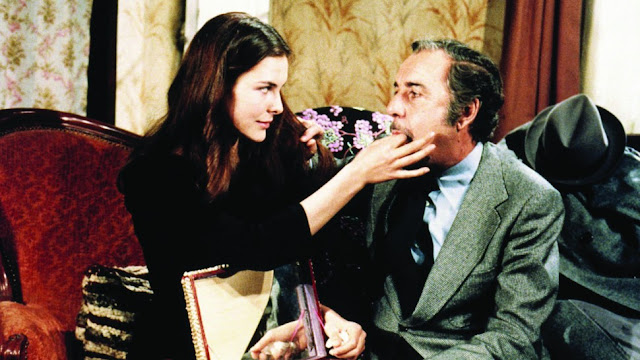That Obscure Object of Desire (1977)
Luis Bunuel's "That Obscure Object of Desire"
Luis Bunuel's final film before his death, "That Obscure Object of Desire" does not feel like a thematic summation of his filmography. That regard would go to his prior film, "The Phantom of Liberty." Rather, "That Obscure Object of Desire" feels more like a strange after-the-fact memo. It does not display the typical levels of surrealism that most Bunuel films are known for. However, it still manages to
Bunuel based his script on the 1898 Pierre Louys novel "The Woman and the Puppet." His film tells the story of a wealthy Frenchman named Mathieu who becomes obsessed with a young, impoverished Spanish flamenco dancer named Conchita. As the two become intertwined in a romance, it becomes clear that Conchita will not let Mathieu have sexual relations with her. She continues to tease and sexually frustrate him, as he continues to give her money and other various things to win her over. Because of her refusal, the two continuously break up and get back together throughout the whole film. In the film's climax, she reveals to him that she has been grifting him the whole time, just after he provides her a brand new house. He beats her, only for her to return and chase him back down. The film ends with the two of them walking together in a market when suddenly, a bomb goes off killing them both.
The relationship between these two raises a lot more questions than it does answers. Was Conchita just using Mathieu for his wealth? If so, then why did she come back to him in the end? Is she playing him or does she actually have affection? Personally, I find that she is in fact grifting him the entire film. Whether or not this is true is up in the air. However, throughout the film, Bunuel makes sure to keep the viewers well aware that there are terrorist acts happening all around the characters. Bombings and shootings are happening everywhere by both left-wing and right-wing terrorist groups. Because this backdrop is so intentional by Bunuel, it seems as though the concept of political terrorism plays in somehow to this push and pull relationship between this bourgeois elite and his beautiful, impoverished tease of a lover. Is SHE representative of the terrorists, using the act of desire as a weapon to pull more and more resources from this wealthy and powerful man? Or is that obscure object of desire just symbolic of terrorism in general, as its irrationality completely erodes and destroys the controlled, ordered self? None of this seems to be clear. However, that is exactly what makes this film so engaging. With Bunuel's final bow, he leaves us with a puzzling array of questions about the nature of our inner selves and that weird and uncontrollable urge that exists inside us all towards that obscure object of desire.




Comments
Post a Comment